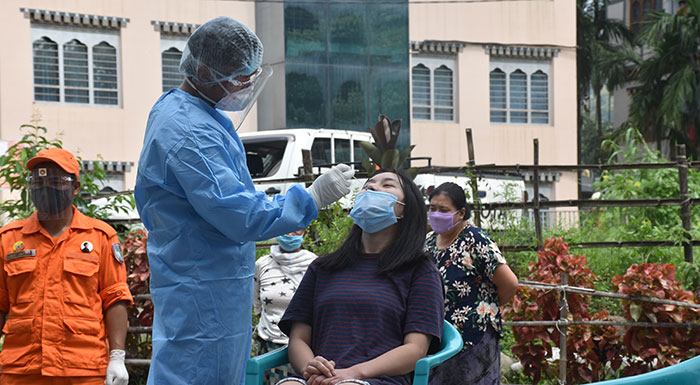How the government’s decision to prioritise lives over livelihood kept the country safe from Covid-19 pandemic
Younten Tshedup
This day last year, as the government entered its second year in office, it laid out ambitious plans in the health sector.
Strengthening primary health facilities by putting in additional endoscopy and ultrasound services, taking cervical cancer programme nationwide, and paying allowance to breastfeeding mothers were on the top on the long list the health ministry drew up for 2020.
However, the onset of the Covid-19 pandemic derailed the plan just when activities were being implemented. The breastfeeding allowance pledge that falls under the Accelerating Mother and Child Health (AMCH) – 1,000 Golden Day Plus programme came to a halt.
The AMCH programme was to be rolled out in August last year, but owing to resource constraints, the programme was deferred to March this year. Before the Gross National Happiness Commission could approve the policy for the reform, the pandemic struck the country.
Despite the challenges that the pandemic posed, the health ministry managed to introduce the comprehensive cervical cancer screening programme across the country. Additional X-ray and ultrasound machines were placed in the remote health centres taking the coverage of this service to almost 90 percent today.
What made the ministry shine this year was in a way triggered by the pandemic itself. Besides being at the centre of the entire preparedness and response efforts, the ministry initiated several initiatives overachieving some of its targets.
The performance
As the threat from the pandemic grew, the health ministry prioritised lives over livelihood, even if that meant halting other aspects of lives.
The Covid-19 pandemic response has so far been a success story, even if its preparedness wasn’t as much. The country has prevented a full-blown outbreak and maintained zero deaths from the pandemic. The ministry was lauded for ‘extra-carefully’ handling the first positive case in March and ensuring the health of those at home and abroad.
Guided by His Majesty The King, repatriation flights brought home Bhutanese stranded abroad. Despite being constrained by resources, the government provided free quarantine in tourist-standard hotels.
And as the rest of the world struggled with shortage of testing kits during the initial months of the pandemic, the ministry initiated mass testing wherever and whenever necessary.
Many today describe the ministry’s approach in handling the pandemic as clinical in nature. It treated the country as a patient – identified the infected, isolated them, ran the diagnosis, and then treated until the patient recovered. The approach to the pandemic, according to the Health Minister Dechen Wangmo has always been evidence-based. Observers say it was a fear tactic.
However, it was easier said than done. The ministry during the initial days was not only fighting the pandemic but also disinformation and fake news.
Marathon of press briefings and ‘fact checks’ to counter disinformation spreading online were held including sharing of multiple public health advisories. This time at least, access to information for the media also improved as health officials including the minister became more available to share updates on the pandemic.
While adherence to the public health safety measures was better among Bhutanese compared to other countries in the region and globally, complacency gradually set in. The drive to make people realise the importance of those measures continues today.
The health ministry did not hesitate from making hard decisions. The 21-day nationwide lockdown brought every activity in the country to a standstill.
Despite numerous challenges, the lockdown served its purpose, at least in breaking the chain of the transmission. Many today still wonder if the lockdown could have been implemented in a more organised manner.
Despite the nationwide lockdown, the ministry managed to keep essential medical services running uninterrupted across the country.
Amid initial hiccups, services like mother and child care, immunisation, reproductive health, emergencies, care for vulnerable populations including persons with disabilities and medication for ongoing management of chronic diseases including mental health continued to be available in all health centres.
If not for the pandemic, some of the ministry’s initiatives would not have happened. The ministry managed to line-list the vulnerable section of the population (infants and those above 60 years) in different dzongkhags.
Counsellors received more attention than ever as mental health issues started troubling people. Handwashing received a big boost and from a public health measure to prevent communicable diseases, it has today become a life saving act.
In anticipation of a second wave of the pandemic, the health ministry started the seasonal influenza vaccine for the entire population.
Then there were other major initiatives the ministry introduced despite being sidelined by the fight against the pandemic. Under the patronage of Her Majesty the Royal Grandmother, Gyalyum Kesang Choeden Wangchuck, the ministry in September launched the HPV vaccination for boys.
Last month, the noncommunicable diseases (NCD) screening services for the civil servants was also launched in light of growing NCD cases in the country.
With His Majesty The King leading the response and three former health professionals at the helm, the country continues to be safe from the global health crisis.
Health Minister Dechen Wangmo said, “What the government has done as a team, as a nation under His Majesty’s leadership is something beyond which we could not have done any better, I feel.”
Lyonpo added that in Bhutan, governance is by destiny. “The way things have come about, as if we knew that there would be a pandemic and the people chose a government that prioritises health. It has to be a divine intervention.”
All in all, the government’s performance in the health sector remains the best among all other sectors given the attention and resources devoted to the development of the various aspects.
If the breastfeeding allowance, the multi-specialist hospital, and the four specialists in every hospital materialise in the coming years, the party remains on track to fulfilling the major pledges in the health sector.


